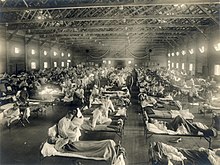
The emerging field of conflict epidemiology offers a more accurate method to measure deaths caused during violent conflicts or wars that can generate more reliable numbers than before to guide decision-makers.
In February 2001 the Carter Center and the United States Institute of Peace (USIP), in collaboration with CARE, Emory University and the Centers for Disease Control and Prevention (CDC), sponsored a meeting on "Violence and Health". The goals of the meeting were to determine the impact of violent conflict on public health and to advise public health training programs on means to enhance the work of public health professionals in working in violent conflicts.
Compiling or estimating the numbers of deaths caused during wars and other violent conflicts is a controversial subject. Historians often put forward many different estimates of the numbers killed during historic conflicts. What conflict epidemiology offers is a better methodology to more accurately estimate actual mortality rates during existing wars and conflict.
As war is a leading cause of illness and death, there are those in the field of public health who argue "war epidemiology" should be a more prominent component of the field of public health.[1]